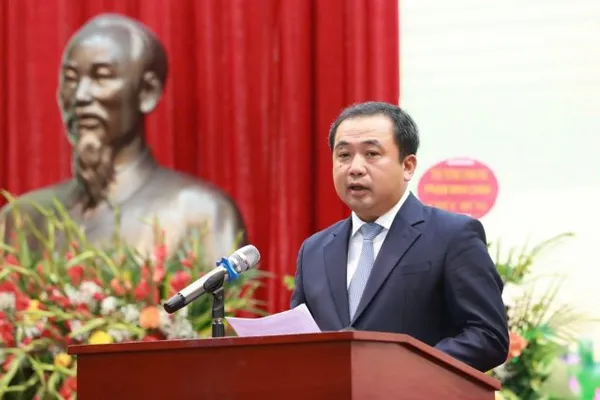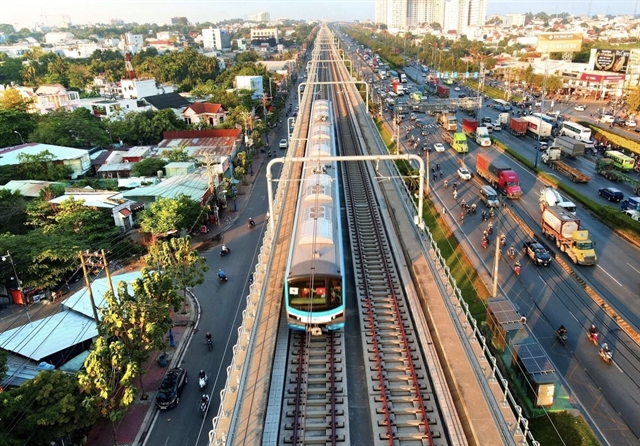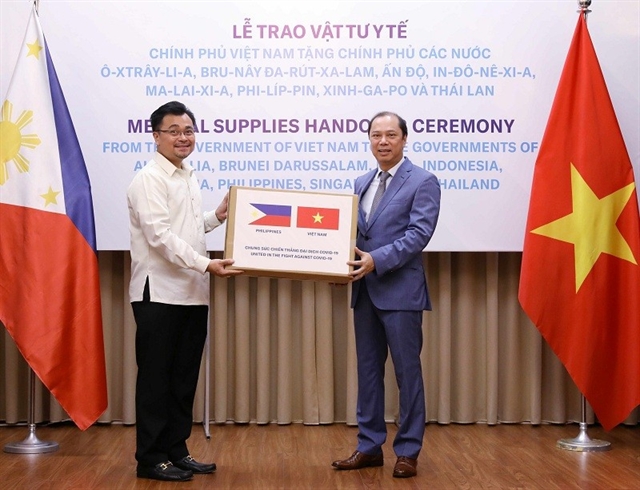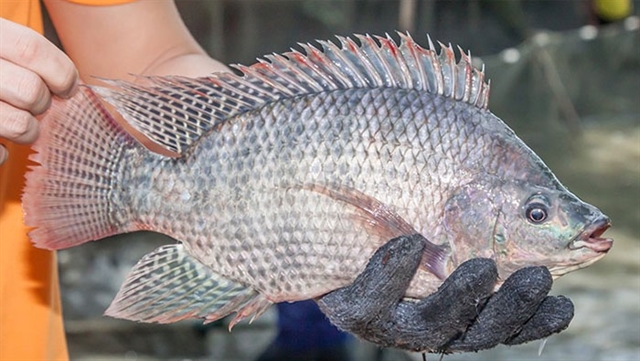 Opinion
Opinion


|
| Deputy Foreign Minister Nguyễn Quốc Dũng (right) handed over medical supplies for the government and people of the Philippines to fight COVID-19 on May 18, 2020. — Photo baoquocte.vn |
Foreign Minister, Bùi Thanh Sơn, talks to Thế giới & Việt Nam (World and Việt Nam) newspaper about Việt Nam’s relationship with the Philippines on the 45th anniversary of officially establishing diplomatic ties (July 12, 1976 – 2021).
What are the most important achievements in the relationship between Việt Nam and the Philippines over the past 45 years?
On July 12, 1976, the Philippines became the fourth nation in ASEAN to officially establish diplomatic relations with Việt Nam.
The Philippines is also one of the first countries in ASEAN to sign the Agreement on Trade, Scientific and Technological Cooperation with Việt Nam (January 9, 1978). This created an important legal framework for boosting trade exchanges between the two countries.
Most notably, the upgrading of relations to a Strategic Partnership (November 17th, 2015) opened up a new chapter in the relationship between Việt Nam and the Philippines. It’s more comprehensive, broader and deeper in scope and substance, within both bilateral and multilateral frameworks.
Cooperation opportunities between the two countries have been realised with specific results in various fields, ranging from politics, diplomacy, trade, investment, national security and defence to education, culture, tourism and people-to-people exchanges as well as at regional and international organisations and forums.
The political and diplomatic relations between the two countries are stronger and political trust is on the rise. Exchanges and contacts at all levels have been regularly maintained. After it became clear that the COVID-19 pandemic showed signs of being more complicated than first thought, leaders of the two countries held phone talks. They shared their experience coping with the disease and exchanged solutions to support each other in the fight against COVID-19. They also discussed cooperation post COVID-19.
The two sides have established and effectively realised important mechanisms and agreements steering the bilateral relations toward the future. The two sides are now effectively implementing the Five-year Plan of Action 2019-2024 for the Việt Nam – Philippines Strategic Partnership.
The economic relations between the two countries have also increased. Over the past 10 years, two-way trade doubled from US$2.4 billion in 2010 to $5.3 billion in 2020. The Philippines is Việt Nam's fifth largest trading partner and the biggest importer of Vietnamese rice. Rice exports to the Philippines were over $1 billion for the first time in 2020.
Defense and security cooperation and people-to-people exchanges have also received due attention from both sides and achieved encouraging results. Việt Nam and the Philippines have been actively working together and supporting each other at multilateral and regional organisations and forums.
The two sides have also contributed to the joint efforts for building a united and resilient ASEAN Community, enhancing ASEAN’s role in security and strategic issues in the region.
Could you talk about the future direction of the Việt Nam-Philippines relationship?
In order to strengthen the relationship between the two countries more deeply and practically in the future, we need to focus on three major directions.
First, it is essential to continue reinforcing and strengthening the traditional friendship and high level of political trust between the two countries’ leadership and people. Việt Nam and the Philippines share a wide range of strategic interests and are similar in population size and development level. This is the important foundation for the two sides to advance and deepen their political ties and trust, at all levels and channels, including the Party, State, Government, and Parliament’s cooperation and people-to-people exchange.
The exchanges and contacts between the leaders of the two countries, together with effective bilateral mechanisms, will help bolster political trust, address challenges and explore new opportunities for cooperation across a broad variety of areas.
In the short term, the two sides need to work together towards successfully organising the Fourth Meeting of the Foreign Ministerial Việt Nam – Philippines Joint Commission for Bilateral Cooperation, and the first Political Consultation at Deputy Foreign Minister level in 2021.
The two sides should also step up collaboration in responding to the COVID-19 pandemic, and make good use of available mechanisms and agreements to address issues in maritime cooperation.
Mutual coordination and support at multilateral and regional cooperation mechanisms are also essential in order to contribute to peace and stability in the region and the world.
Secondly, both Việt Nam and the Philippines are promising markets. Thus, the two sides need to exert every effort to make economic cooperation one of the key drivers for growth in the post-pandemic recovery and also sustainable development, and effective integration into the global supply chain.
Việt Nam is one of the top agricultural exporters in the region, while the Philippines is the second most populous country in ASEAN. The two countries operate highly open and well-integrated economies and are both members of the Regional Comprehensive Economic Partnership (RCEP).
Accordingly, there is huge potential for cooperation between the two sides. In the short term, we should make all efforts to facilitate trade connectivity and step up investment, particularly in areas where either side has great potential and a competitive edge, such as agriculture, industry, tourism and the marine economy.
Further expansion of collaboration into new domains, against the backdrop of the Fourth Industrial Revolution, such as digital transformation, e-commerce and the green economy, should also be explored.
In the interest of effective integration into the global supply chain of goods, the two sides should cooperate in enhancing capacity and making good use of opportunities arising from free trade agreements within ASEAN and with other partners, especially the RCEP.
Thirdly, it is necessary to continually advance cooperation between the two countries at regional and international organisations and forums in order to maintain an environment of peace, stability, cooperation and prosperity. — VNS




